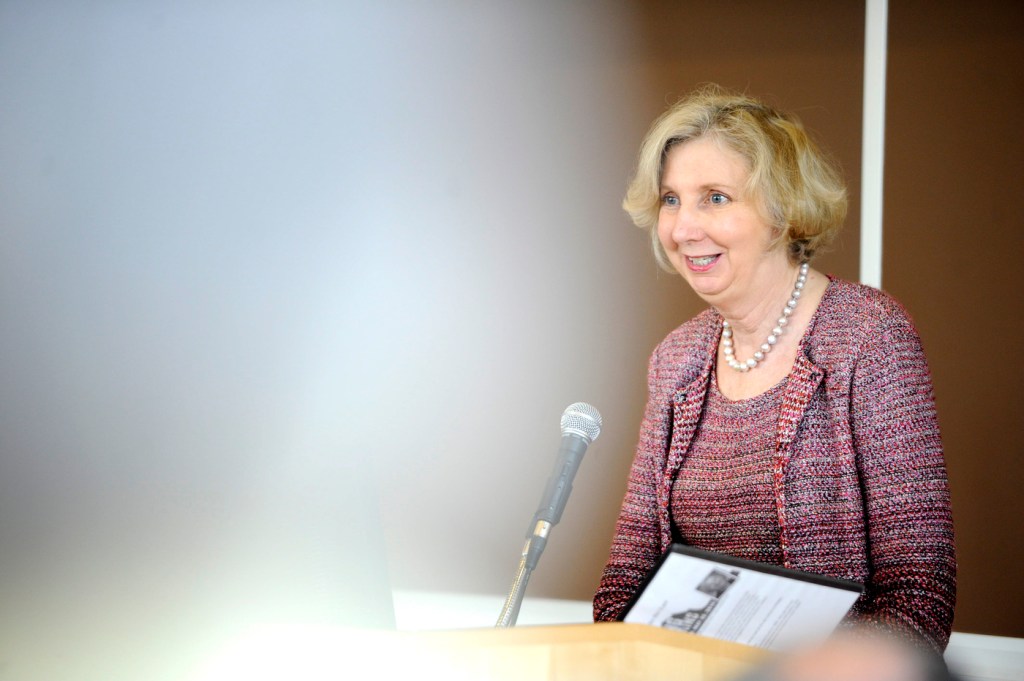Why gender diversity in the judicial system matters

Dana Fabe recalled that when she entered law school at Northeastern in 1973, women comprised more than 50 percent of her class, compared to only 20 percent of law school classes nationally.
Fabe, who delivered the keynote address Friday in Dockser Hall at the eighth annual Women in the Law conference, described Northeastern’s School of Law as a “progressive pioneer.” She said that while law schools have made great progress, “the judiciary has much catching up to do.” She pointed to statistics showing that women make up only about one-third of federal court trial benches, federal courts of appeals judges, and states’ highest courts. Two states—Iowa and Idaho—have no female justices on their highest courts, she added.
Fabe has served three terms as chief justice of the Alaska Supreme Court—only the second justice in the court’s history to serve three terms—and was the first woman to serve on the court and as chief justice. She is retiring from the bench in June.

Jeremy Paul, dean of the School of Law, hugs Dana Fabe, L’76, after introducing her at the conference. Photo by Matthew Modoono/Northeastern University
Female chief justices’ impact on the nation’s courts
Fabe said research is mixed on whether female judges decide cases differently than men, but these justices’ impact on the courts are felt in many other ways. “In my view, women chief justices have made a tremendous difference in their courts and the justice systems of our country,” said Fabe, L’76.
She cited the example of Massachusetts Chief Justice Margaret Marshall, the state’s first female chief justice, authoring the court’s decision to legalize same-sex marriage in 2003. That “historic opinion of course became the law of the land last year,” she said.
She also underscored the work of justices Judith Kaye of New York and Kathleen Blatz of Minnesota as pioneers for protecting abused and neglected children. They “made it their cause to bring to light the need to handle these cases efficiently and effectively in the courts so that children didn’t spend their childhoods in foster care and lose the chance for adoption and a permanent home,” she said.
In my view, women chief justices have made a tremendous difference in their courts and the justice systems of our country.
— Dana Fabe, L’76
Work-life balance
Fabe said female chief justices have also made important strides toward achieving greater work-life balance in the legal profession, a topic of significant personal importance to her throughout her career. She reflected back to 1981 when she was a public defender for the state of Alaska. As the supervisor of 12 branch offices across the state, she experimented with what at the time were considered “some novel flexible scheduling ideas.” These included instituting flex-time, creating job shares and job rotations, and providing flexible and generous leave time for new parents before the Family and Medical Leave Act of 1993.
She’s also prioritized work-life balance during her tenure on the Alaska Supreme Court and as past president of the National Association of Women Judges.
“In my experience, the flexibility in the workplace that I was able to provide as a public defender led to happy, productive attorneys and staff, and really stopped the turnover that was being experienced at the public defender agency when I took over,” she said.

Audience members listen to Dana Fabe’s keynote address in Dockser Hall. Photo by Matthew Modoono/Northeastern University
Her journey to Northeastern, and then to Alaska
During a Q&A following her keynote address, Fabe was asked to reflect on her decision to attend Northeastern and the journey to Alaska. She explained that while she was studying music history and art history at Cornell University, she expected to ultimately pursue her doctorate and study Mozart. But taking a constitutional law class changed everything. “I was hooked,” she said.
When applying to law school, Northeastern’s co-op program particularly stood out. Her four co-ops took her to firms and law offices in Boston, Montana, Kentucky, and Hawaii, and she found her niche, choosing criminal defense and constitutional law. After graduation, she took a post-graduate clerkship with the Alaska Supreme Court and later became the court’s first female chief justice.
“Northeastern really gave me the foundation in every way—legally, analytically, critical thinking,” Fabe said. “I will always be grateful to the law school because of that.”





